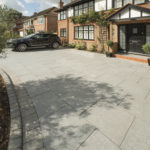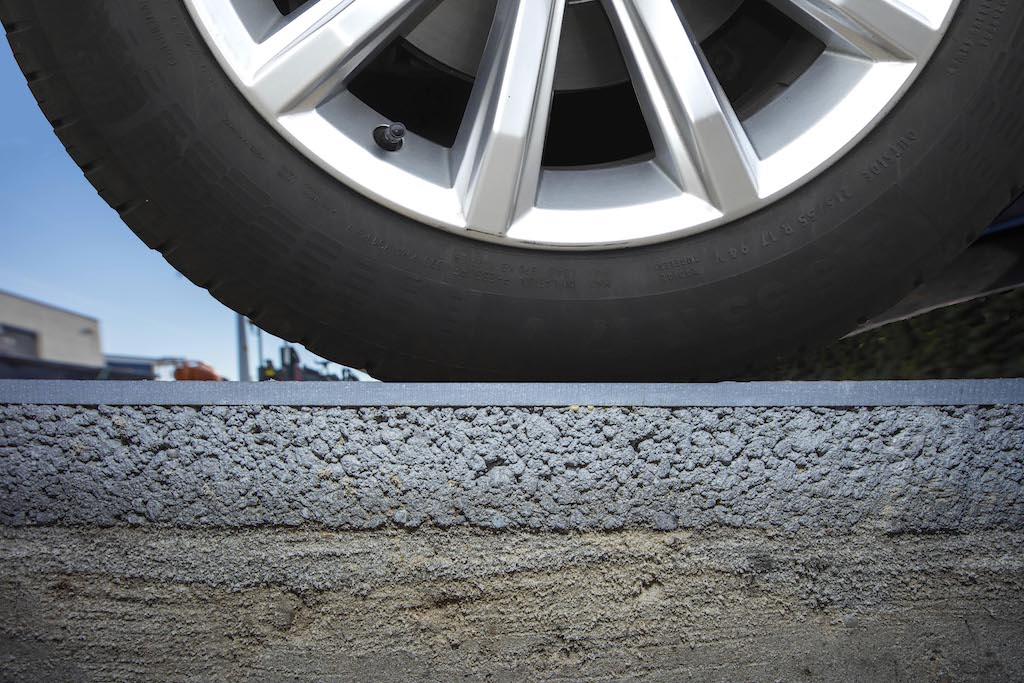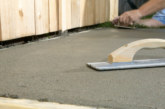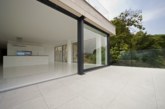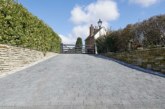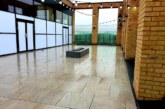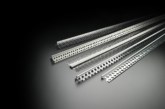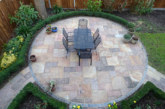New manufacturing methods have enabled Brett Landscaping to offer porcelain paving products for a wider range of developments.
There has never been any doubt that porcelain has an impressive finish but an evolution in manufacturing technology means that housebuilders and developers can also take advantage of a speedy and efficient installation.
Installing porcelain will ensure a beautiful finish but the process must be followed correctly. The bound method of setting the sub-base, making the bedding course, priming the slabs with cementitious primer, laying the slabs, waiting a day to be able to start the jointing – can be a daunting prospect when speed is of the essence.
There is, however, a way to achieve a high quality aesthetic finish using unbound methods – just a sand laying course and a narrow sand-filled joint. This allows the benefits of porcelain paving to be enjoyed while also offering the speed, ease and cost benefits from unbound installation methods – provided you have the correct product.
Porcelain has long been used for high-end garden patios but advances in technology mean that larger developments can benefit from the low-maintenance and long-lasting qualities of the material.
Porcelain paving slabs are made by selecting suitable raw materials, grinding these materials to make them incredibly fine, combined with a suitable mix design and a precisely controlled manufacturing process. This includes finely grading the right type of clays and firing them at an extremely high, controlled temperature in a kiln.
It is ideally suited to use outdoors as it is extremely strong, hard-wearing and low maintenance. It uses the aesthetic of natural stone while adding the benefits of modern paving manufacturing.
It is now an increasingly popular material for large projects due to its stylish finish but also the lack of water absorbency helps with stain resistance, meaning that the tiles are easier to clean and maintain. Having a very low porosity, this enhances the frost resistance and provides longevity to the installation.
Using porcelain paving can bring a unique aesthetic with a mixture of light and shade the design of a scheme providing a premium finish which will retain its looks for years to come.
Flexible spaces
Its versatility in working in an indoor and outdoor setting also provides an elegant way to design large flexible spaces that can adapt to environmental factors. For an ‘inside-out’ look, designers can source 10mm and 40mm hybrid products from the same supplier with matching designs. The 10mm will suit, for example, a kitchen – while the 40mm hybrid will be perfect for the patio adjoining the kitchen.
There had previously been question marks about the material’s suitability for some functions on housing developments but modern manufacturing techniques mean that there is now a solution for large projects without compromising on the quality of finish. That solution is a composite porcelain and concrete paving flag tile with a pre-bonded, cementitious, water-permeable drainage layer.
While 10mm slabs would suit an interior and 40mm slabs suit a garden, using innovative manufacturing techniques, a composite porcelain unit can be made at a thickness of 60mm which makes it suitable for use on driveways and areas of very high pedestrian traffic.
Each pre-bonded flag unit features integrated nibs on all four sides which help to protect the porcelain face during transit and installation, along with providing a consistent joint width when the slabs are installed.
As the system is supplied as a porcelain tile with a concrete backing it means it can be laid and walked on much more quickly. It is installed as simply and flexibly as a concrete slab rather than a ridged installation usually associated with porcelain paving.
On a large, light duty traffic area like a path or driveway there can be a reluctance to install porcelain as contractors would be laying mortar beds, priming and grouting. With the hybrid slab the speed of installation, with sand-filling of the joints, is considerably faster. It is as easy as with a standard concrete unit.
There also may have been concerns over the durability but Brett Landscaping’s 60mm GeoCeramica porcelain surface slabs are permanently and inseparably bonded to a drainage mortar base which offers excellent stability, strength, drainage and adhesion.
These technological advances have given builders and developers the confidence to know that they can specify porcelain and it will be an efficient solution as well as a visually pleasing one.

